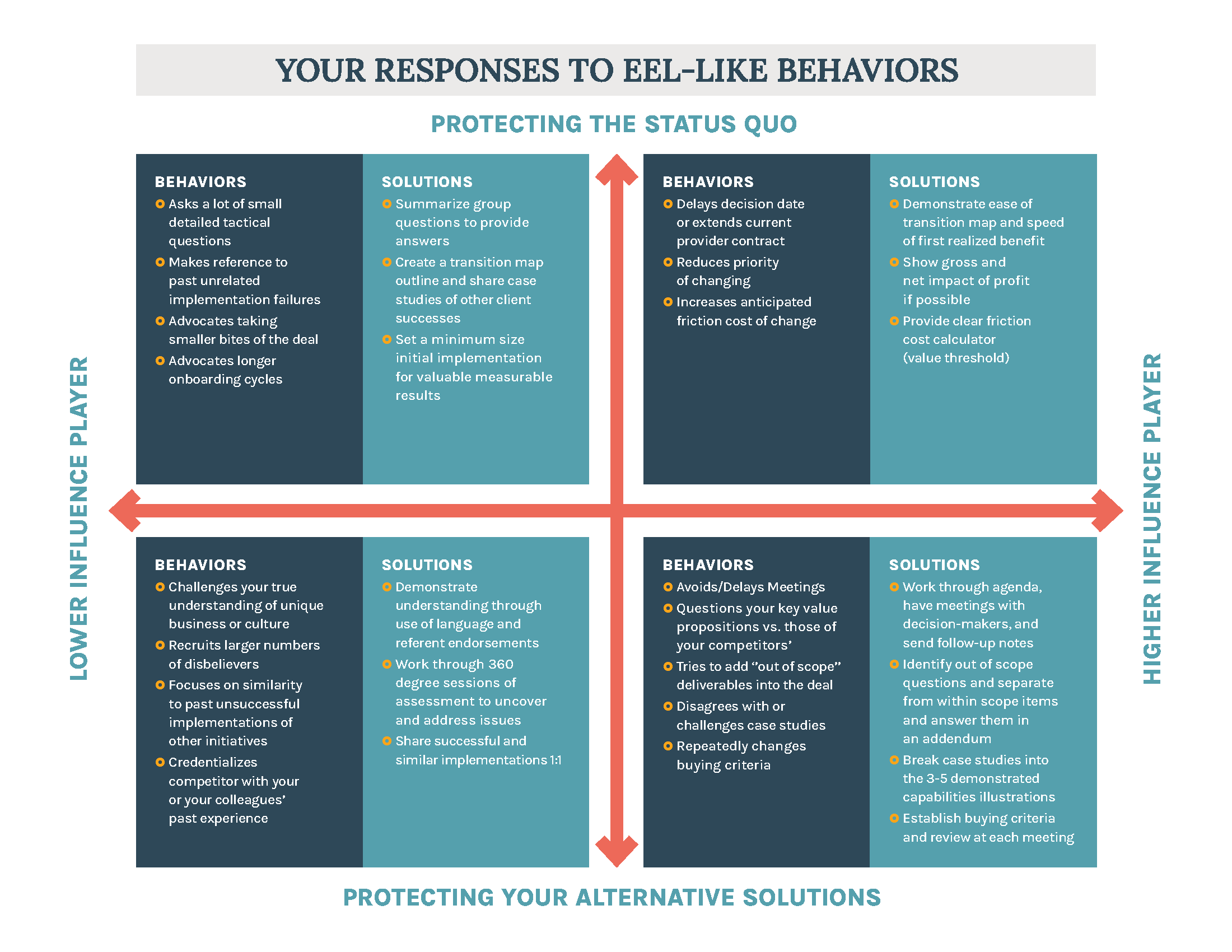Eel
Noun
1. (sealife) a snake-like fish with a slender body, proverbial known for its slipperiness.
2. (business jargon) the gatekeepers, deal spoilers, and nay-sayers at the whale company who work to prevent any sort of change.
In every sea there’s an eel, and there’s also one in every deal. When prospecting, the eel is the person who is against the deal—maybe on principle, maybe because they’re your competitor’s champion, or maybe they somehow see the engagement as detrimental to them in some way. Or, let’s be honest, they may just be a curmudgeon who doesn’t want to see change. These people are often those who have been at the company for a while, which means their opinion matters and it can be harder to change. Regardless of the reason, you need to find the eel in order to clinch the big sales deal.
Now, old-school sales training might suggest that you should talk as much as possible to your champion but as little as possible to the eel. That may be problematic: the eel is the one who has the power to squash the big sales deal. Worse yet, eels have a tendency to lurk in the shadows. They’re hard to get to and they usually talk you down when you’re not around. The conversation may be innocuous, sounding something like this:
- “I’m just concerned that we might be taking on too much right now with this change.”
- “Let’s bring this deal in after the SAP upgrade gets completed. We can talk then.”
- “Don’t get me wrong, I think this is a great idea — I just wish we had the resources to support it.”
And so on, telling you the “timing isn’t right” without giving any concrete or rational reasons why that’s so. In fact, as you know, this big sales deal would be mutually beneficial — even to the eel. And that’s what you need to convince him or her of.
The bottom line is that eels try to get you out. I have a client that just lost a deal from an eel he never met and never will. What to do?
Come in with strategies assuming there will be an eel; you’ll come to discover more often than not there’s one waiting for you. There’s an old saying in poker: If you play three hands of poker and you haven’t figured out who the chump is, leave! You’re the chump. You have to find out who the eel is before you can take any action.
We have created a diagnostic tool to help you identify and mitigate your eel. You can find it below or download it here. If you download the pdf, look at side/page 1 to identify where your eel is on the quadrant. Start by identifying how much influence your eel has on the decision. Next, determine if the eel is protecting the status quo or an alternative. Now read the behaviors of the eel and see if they match what you are experiencing. If they do, go to page 2 and learn what to do to mitigate their negative influence.
Have you subscribed to our newsletter yet? Click here to get monthly news and insights from HBS.
Here are five convincing sales techniques to help you circumvent the eel to close the deal:
1) Co-Op. Take their ideas and bake them into your solution. Give the credit liberally and frequently to your eel as the source of the great changes. You are working to have this be their idea to warm them up…and win them over in order to land the massive sale.
2) Pair them up. Find the person in your organization who speaks the eel’s language. Maybe they match each other in education, age, or style, which creates the friendly link for back-channel dialogue to turn them, or at least neutralizes the negative. Remember, many sales methodologies are about leveraging the interpersonal.
3) Containment. This is a combination of conceding all of this person’s small issues and points and then turning the conversation to the resolution of the bigger issues. You have to limit the scope of influence on your deal to items that are contained rather than allowing them to fester into deal-killers.
4) Find them another bone. Sometimes a curmudgeon wears out their welcome and their interest on a deal. Your job is to have enough knowledge about the company and the issues to refocus the eel on another part of the world that is not your deal.
5) Make others’ voices heard. Sometimes, it’s not just you who knows there’s an eel: the companies you are working with are often also aware that their coworker is a toughie. If the eel at hand is being particularly vocal, invite the opinions or engage others who are perhaps being silent. This will show you care for and value their thoughts, and it may give them the confidence to speak their minds and tip the scales in your favor, starting a sea change current the eel can’t swim in.
Let’s face it, every deal has an eel—especially when the stakes are high, or the deal is a significant investment. If you have read this, and/or used the diagnostic tool and still feel outmatched by your own eel(s), give us a shout here. We can help you land those big sales!

